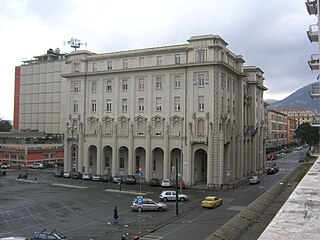
The province of La Spezia is a province in the Liguria region of Italy. Its capital is the city of La Spezia.
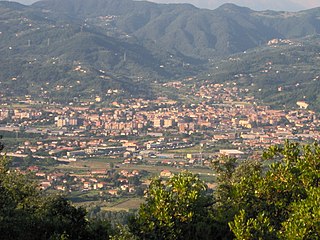
Sarzana is a town, comune (municipality) and former short-lived Catholic bishopric in the Province of La Spezia, Liguria, Italy. It is 15 kilometres (9 mi) east of La Spezia, on the railway to Pisa, at the point where the railway to Parma diverges to the north. In 2010, it had a population of 21,978.
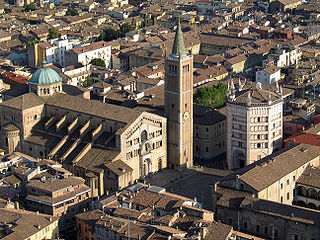
Parma Cathedral is a Roman Catholic cathedral in Parma, Emilia-Romagna (Italy), dedicated to the Assumption of the Blessed Virgin Mary. It is the episcopal seat of the Diocese of Parma. It is an important Italian Romanesque cathedral: the dome, in particular, is decorated by a highly influential illusionistic fresco by Renaissance painter Antonio da Correggio.

Bobbio Abbey is a monastery founded by Irish Saint Columbanus in 614, around which later grew up the town of Bobbio, in the province of Piacenza, Emilia-Romagna, Italy. It is dedicated to Saint Columbanus. It was famous as a centre of resistance to Arianism and as one of the greatest libraries in the Middle Ages. The abbey was dissolved under the French administration in 1803, although many of the buildings remain in other uses.
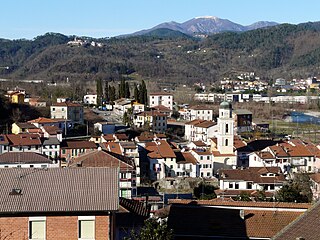
Borghetto di Vara is a comune (municipality) in the Province of La Spezia in the Italian region Liguria, located about 70 kilometres (43 mi) southeast of Genoa and about 15 kilometres (9 mi) northwest of La Spezia.

Brugnato is a comune (municipality) in the Province of La Spezia in the Italian region Liguria, located about 70 kilometres (43 mi) southeast of Genoa and about 15 km northwest of La Spezia. As of 31 December 2004, it had a population of 1,205 and an area of 12.0 square kilometres (4.6 sq mi). It borders the following municipalities: Borghetto di Vara, Rocchetta di Vara, Sesta Godano, Zignago.

Riccò del Golfo di Spezia is a comune (municipality) in the Province of La Spezia in the Italian region Liguria, located about 80 kilometres (50 mi) southeast of Genoa and about 10 kilometres (6 mi) northeast of La Spezia.

The Diocese of La Spezia-Sarzana-Brugnato is a Latin diocese of the Catholic Church in Liguria, northern Italy, created in 1929. It is a suffragan of the Archdiocese of Genoa.
The Diocese of Luni was a Roman Catholic bishopric with its seat in Luni, Liguria, northwestern Italy. The bishop and cathedral chapter moved to Sarzana in the 12th century; the move was formalised in 1201. Though the bishops of Luni had been resident at Sarzana long before the official transfer of the cathedral, the diocese and bishop continued to use the name of Luni in their titles down to 1465, when the name of Sarzana was added to both.

Sarzana Cathedral in Sarzana, Liguria, Italy, is a co-cathedral of the Diocese of La Spezia-Sarzana-Brugnato. It is dedicated to the Assumption of the Virgin Mary. The building is a mixture of the Romanesque and Gothic styles, reflecting the length of the period of its construction, from the early 13th to the late 15th century.

Luni Cathedral, previously the Pieve of Santa Maria, was located in Luni, in Liguria, Italy, near the port. According to archaeological discoveries the church was built by the Romans in the late 4th and early 5th century and was the centre of the Diocese of Luni.

Santa Maria di Nazareth is a Renaissance church in the town of Sestri Levante, in the Gulf of Tigullio in the Metropolitan City of Genoa. Located in the center of the old village of Sestri Levante, adjacent to the town hall, its parish community is part of the Diocese of Chiavari.

Nino Staffieri was an Italian bishop of the Roman Catholic Diocese of La Spezia-Sarzana-Brugnato.
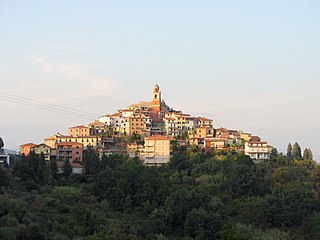
Valeriano Lunense is a village (frazione) of about 500 inhabitants in the comune of Vezzano Ligure in the province of La Spezia, Italy.

The Cathedral of Sansepolcro is a Catholic church in Sansepolcro, Tuscany, central Italy.

La Spezia Cathedral is a Roman Catholic cathedral in La Spezia, Italy. It is the cathedral of the Diocese of La Spezia-Sarzana-Brugnato. It was built between 1956 and 1975, according to designs by Adalberto Libera.
The Roman Catholic Diocese of Brugnato was a Roman Catholic diocese located in the city of Brugnato in the Province of La Spezia in the Italian region Liguria of Italy. On 25 November 1820, it was united with and suppressed to the Diocese of Luni e Sarzana to form the Diocese of Luni, Sarzana e Brugnato.

Anagni Cathedral is a Catholic cathedral in Anagni, Lazio, Italy, home to the cathedra of the Diocese of Anagni-Alatri. It is a Marian church dedicated to the Annunciation of the Blessed Virgin Mary.

Casale Monferrato Cathedral is a Roman Catholic cathedral in Casale Monferrato, province of Alessandria, Piedmont, Italy, dedicated to Saint Evasius. It is the episcopal seat of the Diocese of Casale Monferrato.























